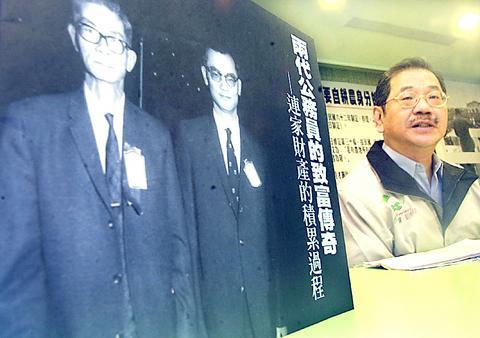The Democratic Progressive Party (DPP) yesterday published a booklet detailing how Chinese Nationalist Party (KMT) Chairman Lien Chan (連戰) and his father, Lien Chen-tung (連震東), a high-ranking official of the former KMT administration, had abused their power to accumulate family wealth.
The booklet, 500,000 copies of which will be distributed around the country during the next 10 days, details the dubious process by which Lien and his father acquired various tracts of land, which are now used for commercial purposes.

PHOTO: CHEN TSE-MING, TAIPEI TIMES
The booklet starts with Lien Chen-tung's rise from a poor civil servant to the seventh wealthiest man in Taipei within 11 years of the KMT's settlement in Taiwan in 1949.
The Lien family has said many times that the family had no property. Lien once wrote in a Hong Kong newspaper that "the Lien family has long lived in Tainan City and all the family assets were confiscated after the Japanese occupied Taiwan" in 1895.
Using land purchase certificates as evidence, the booklet says that the first piece of land Lien Chen-tung bought in 1949 is now the site of the second hall of the Idee Department Store on Taipei's Nanjing West Road.
The documents show that Lien Chen-tung bought the land in 1949, a year before official records show that the KMT government nationalized the property in 1950. Another document shows that the land was transferred to Lien in 1951.
"This piece of land should have belonged to the government. But actually Lien bought it before the government nationalized the land," DPP campaign headquarters spokesperson Wu Nai-jen (
Wu said the land was involved in a series of scandals as it was once used for a karaoke bar, which burned down in 1995 because of lax fire-prevention facilities, and then a video game parlor, which was closed in 1996 following a crackdown instigated by former Chen Shui-bian (
In addition to the unjust way in which it obtained the government-owned property, the Lien family also illegally bought farming land and put it to commercial uses.
Wu yesterday said Lien Chan bought land as a farmer in Taipei City's Shihlin District in 1959 when he studied in the US. The land was made available for commercial uses a year later.
In 1961, Lien Chen-tung used the same method to buy another piece of land in the same area and completed the land recategorization five years later.
Lien's eldest daughter, Lien Hui-hsin (
Wu yesterday said although the Agricultural Development Act (ADA,
Wu yesterday dismissed KMT Secretary General Lin Feng-cheng's (林豐正) defense that the ADA was not applicable and therefore the Lien family was not breaking the law in conducting such deals.
"Lin's defense was utter lies. The law said clearly that even before 1973, only those who are able to cultivate the land are eligible for owning farming land," Wu said.
Not to be outdone, the KMT is running TV commercials targeting Chen Shui-bian's family wealth.
Also see story:

DAREDEVIL: Honnold said it had always been a dream of his to climb Taipei 101, while a Netflix producer said the skyscraper was ‘a real icon of this country’ US climber Alex Honnold yesterday took on Taiwan’s tallest building, becoming the first person to scale Taipei 101 without a rope, harness or safety net. Hundreds of spectators gathered at the base of the 101-story skyscraper to watch Honnold, 40, embark on his daredevil feat, which was also broadcast live on Netflix. Dressed in a red T-shirt and yellow custom-made climbing shoes, Honnold swiftly moved up the southeast face of the glass and steel building. At one point, he stepped onto a platform midway up to wave down at fans and onlookers who were taking photos. People watching from inside

A Vietnamese migrant worker yesterday won NT$12 million (US$379,627) on a Lunar New Year scratch card in Kaohsiung as part of Taiwan Lottery Co’s (台灣彩券) “NT$12 Million Grand Fortune” (1200萬大吉利) game. The man was the first top-prize winner of the new game launched on Jan. 6 to mark the Lunar New Year. Three Vietnamese migrant workers visited a Taiwan Lottery shop on Xinyue Street in Kaohsiung’s Gangshan District (崗山), a store representative said. The player bought multiple tickets and, after winning nothing, held the final lottery ticket in one hand and rubbed the store’s statue of the Maitreya Buddha’s belly with the other,

‘NATO-PLUS’: ‘Our strategic partners in the Indo-Pacific are facing increasing aggression by the Chinese Communist Party,’ US Representative Rob Wittman said The US House of Representatives on Monday released its version of the Consolidated Appropriations Act, which includes US$1.15 billion to support security cooperation with Taiwan. The omnibus act, covering US$1.2 trillion of spending, allocates US$1 billion for the Taiwan Security Cooperation Initiative, as well as US$150 million for the replacement of defense articles and reimbursement of defense services provided to Taiwan. The fund allocations were based on the US National Defense Authorization Act for fiscal 2026 that was passed by the US Congress last month and authorized up to US$1 billion to the US Defense Security Cooperation Agency in support of the

‘COMMITTED TO DETERRENCE’: Washington would stand by its allies, but it can only help as much as countries help themselves, Raymond Greene said The US is committed to deterrence in the first island chain, but it should not bear the burden alone, as “freedom is not free,” American Institute in Taiwan Director Raymond Greene said in a speech at the Institute for National Defense and Security Research’s “Strengthening Resilience: Defense as the Engine of Development” seminar in Taipei yesterday. In the speech, titled “Investing Together and a Secure and Prosperous Future,” Greene highlighted the contributions of US President Donald Trump’s administration to Taiwan’s defense efforts, including the establishment of supply chains for drones and autonomous systems, offers of security assistance and the expansion of